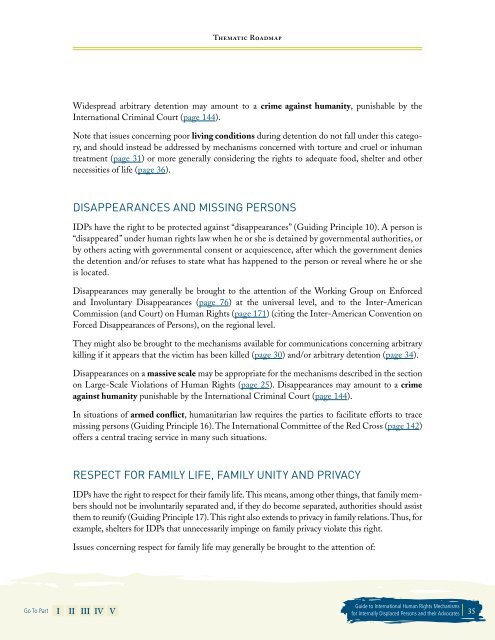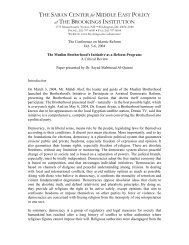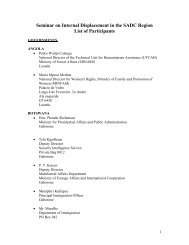Guide to International Human Rights Mechanisms - Brookings
Guide to International Human Rights Mechanisms - Brookings
Guide to International Human Rights Mechanisms - Brookings
Create successful ePaper yourself
Turn your PDF publications into a flip-book with our unique Google optimized e-Paper software.
Go To Part I II III IV V<br />
Thematic Roadmap<br />
Widespread arbitrary detention may amount <strong>to</strong> a crime against humanity, punishable by the<br />
<strong>International</strong> Criminal Court (page 144).<br />
Note that issues concerning poor living conditions during detention do not fall under this category,<br />
and should instead be addressed by mechanisms concerned with <strong>to</strong>rture and cruel or inhuman<br />
treatment (page 31) or more generally considering the rights <strong>to</strong> adequate food, shelter and other<br />
necessities of life (page 36).<br />
DISAPPEARANCES.AND.MISSING.PERSONS<br />
IDPs have the right <strong>to</strong> be protected against “disappearances” (Guiding Principle 10). A person is<br />
“disappeared” under human rights law when he or she is detained by governmental authorities, or<br />
by others acting with governmental consent or acquiescence, after which the government denies<br />
the detention and/or refuses <strong>to</strong> state what has happened <strong>to</strong> the person or reveal where he or she<br />
is located.<br />
Disappearances may generally be brought <strong>to</strong> the attention of the Working Group on Enforced<br />
and Involuntary Disappearances (page 76) at the universal level, and <strong>to</strong> the Inter-American<br />
Commission (and Court) on <strong>Human</strong> <strong>Rights</strong> (page 171) (citing the Inter-American Convention on<br />
Forced Disappearances of Persons), on the regional level.<br />
They might also be brought <strong>to</strong> the mechanisms available for communications concerning arbitrary<br />
killing if it appears that the victim has been killed (page 30) and/or arbitrary detention (page 34).<br />
Disappearances on a massive scale may be appropriate for the mechanisms described in the section<br />
on Large-Scale Violations of <strong>Human</strong> <strong>Rights</strong> (page 25). Disappearances may amount <strong>to</strong> a crime<br />
against humanity punishable by the <strong>International</strong> Criminal Court (page 144).<br />
In situations of armed conflict, humanitarian law requires the parties <strong>to</strong> facilitate efforts <strong>to</strong> trace<br />
missing persons (Guiding Principle 16). The <strong>International</strong> Committee of the Red Cross (page 142)<br />
offers a central tracing service in many such situations.<br />
RESPECT.FOR.FAMILy.LIFE,.FAMILy.UNITy.AND.PRIVACy<br />
IDPs have the right <strong>to</strong> respect for their family life. This means, among other things, that family members<br />
should not be involuntarily separated and, if they do become separated, authorities should assist<br />
them <strong>to</strong> reunify (Guiding Principle 17). This right also extends <strong>to</strong> privacy in family relations. Thus, for<br />
example, shelters for IDPs that unnecessarily impinge on family privacy violate this right.<br />
Issues concerning respect for family life may generally be brought <strong>to</strong> the attention of:<br />
<strong>Guide</strong> <strong>to</strong> <strong>International</strong> <strong>Human</strong> <strong>Rights</strong> <strong>Mechanisms</strong><br />
for Internally Displaced Persons and their Advocates











